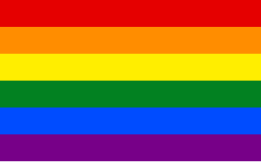Portal:LGBTQ
| Main page | WikiProjects & Things you can do |

|
The LGBTQ+ Portal |

|

|

|
Introduction The Castro, a historic gay village in San Francisco  LGBTQ (also commonly seen as LGBT, LGBT+, LGBTQ+, LGBTQIA, and LGBTQIA+) is an initialism for lesbian, gay, bisexual, transgender and queer or questioning. It is an umbrella term, originating in the United States, broadly referring to all sexualities, romantic orientations, sex characteristics, and gender identities that are not heterosexual, heteroromantic, cisgender, or endosex. In the 1990s, gay, lesbian, and bisexual activists adopted the initialism LGB. Terminology eventually shifted to LGBT, as transgender people gained recognition. Around that time, some activists began to reclaim the term queer, seeing it as a more radical and inclusive umbrella term, though others reject it, due to its history as a pejorative. In recognition of this, the 2010s saw the adoption of LGBTQ, and other more inclusive variants. (Full article...)
Selected article -
Before 1933, male homosexual acts were illegal in Germany under Paragraph 175 of the German Criminal Code. The law was not consistently enforced, however, and a thriving gay culture existed in major German cities. After the Nazi takeover in 1933, the first homosexual movement's infrastructure of clubs, organizations, and publications was shut down. After the Röhm purge in 1934, persecuting homosexuals became a priority of the Nazi police state. A 1935 revision of Paragraph 175 made it easier to bring criminal charges for homosexual acts, leading to a large increase in arrests and convictions. Persecution peaked in the years prior to World War II and was extended to areas annexed by Germany, including Austria, the Czech lands, and Alsace–Lorraine. The Nazi regime considered the elimination of all manifestations of homosexuality in Germany one of its goals. Men were often arrested after denunciation, police raids, and through information uncovered during interrogations of other homosexuals. Those arrested were presumed guilty, and subjected to harsh interrogation and torture to elicit a confession. Between 1933 and 1945, an estimated 100,000 men were arrested as homosexuals; around 50,000 of these were sentenced by civilian courts, 6,400 to 7,000 by military courts, and an unknown number by special courts. Most of these men served time in regular prisons, and between 5,000 and 6,000 were imprisoned in concentration camps. The death rate of these prisoners has been estimated at 60 percent, a higher rate than those of other prisoner groups. A smaller number of men were sentenced to death or killed at Nazi euthanasia centres. Nazi Germany's persecution of homosexuals is considered to be the most severe episode in a long history of discrimination and violence targeting sexual minorities. (Full article...) Selected biography -Amandla Stenberg (born October 23, 1998) is an American actress. She began her career as a child and received recognition for playing Rue in the action film The Hunger Games (2012). As she grew older, she appeared in the supernatural series Sleepy Hollow (2013–2014) and the romance film Everything, Everything (2017). She received praise for her performance as a teenager witnessing a police shooting in the drama film The Hate U Give (2018). She then starred in the comedy horror film Bodies Bodies Bodies (2022) and the Star Wars series The Acolyte (2024). Outside of acting, Stenberg made her musical debut in 2015, performing as part of the folk rock duo Honeywater, and performed the song "Let My Baby Stay" for Everything, Everything. She is also noted for her activism towards LGBT youth, and was included on Time's lists of most influential teens in 2015 and 2016. (Full article...) Selected quote -
Current events
Selected image - Torchwood/Doctor Who star John Barrowman (saluting, in the style of his TV character), and partner Scott Gill (left), on a parade float at Pride London in 2007. Barrowman and Gill entered a civil partnership in December 2006.
Did you know… -
This month's birthdays
Selected listsRelated portalsFeatured contentThe following articles and lists have been identified as some of the best produced by the Wikipedia community:
TopicsCategoriesAssociated WikimediaThe following Wikimedia Foundation sister projects provide more on this subject:
Discover Wikipedia using portals |
























